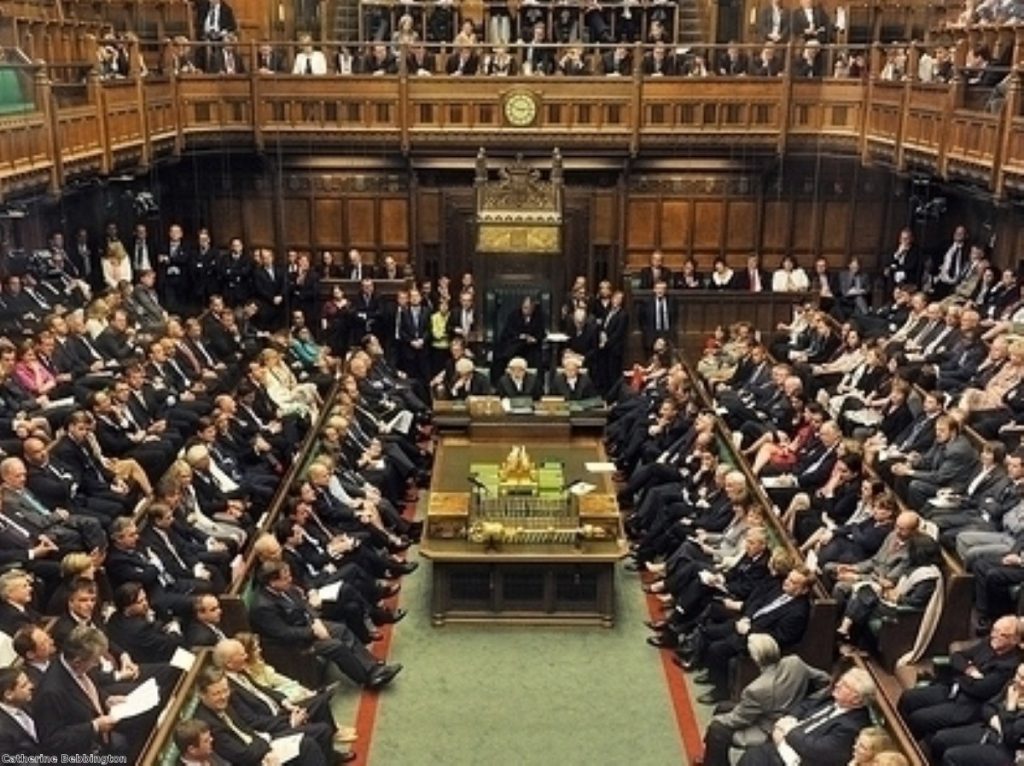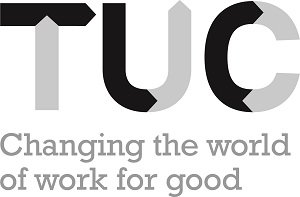It is the settled constitutional position of the United Kingdom that sovereignty rests with Parliament. The preamble to all Acts of Parliament reads as follows:
BE IT ENACTED by the Queen’s most Excellent Majesty, by and with the advice and consent of the Lords Spiritual and Temporal, and Commons, in this present Parliament assembled, and by the authority of the same, as follows:
Technically, Britain is ruled by the Crown in Parliament. This means that laws and decisions are made by the Monarch as represented and advised by her government with the support of both Houses of Parliament.
The centre of power in this relationship has shifted over the centuries from the Monarch themselves, to the Houses of Parliament in tandem, and then to the House of Commons in particular.

The dominance of the House of Commons is derived from its position as the only elected element of Parliament. As such, it can claim popular sovereignty as well as the right to rule.
The House of Commons is the first chamber of Parliament and is also called the Lower House. It is probably the institution most associated with the idea of Parliament in the mind of the British public. It is the pre-eminent of the two chambers. The leader of the largest party in the Commons is traditionally asked by the Monarch to be Prime Minister and to form the Government. Most ministers are chosen from amongst the governing party’s MPs within the House of Commons. The dominant party in the House of Commons brings forwards, and normally passes, its legislative agenda.
More theoretically, the absolute sovereignty of the Crown in Parliament is tempered by the willingness of the people to obey the laws it passes and the decisions it makes.
Prior to Brexit, Britain’s membership of the European Union had seen the House of Commons suborn some of its power, to the extent that the United Kingdom was required to comply with European Union treaties and directives and with the principles of the European Convention on Human Rights.
There is no codified constitution for the United Kingdom but that does not mean that the British constitution is completely unwritten. A range of documents all the way from the Magna Carta right up to the 1998 Human Rights Act, the 1998 Scotland Act, and the 1998 Government of Wales Acts express powers and rights that define the shape of British politics and the actions of the government.
Similarly, there is no codification of the procedures of Parliament, although certain publications are cited as authorities. The functioning of the House of Parliament, and the House of Commons within that, is characterised by historic convention and the ‘sedimentation’ of hundreds of years of practice.
Members of the House of Commons hold, in effect, a triple mandate. They represent all the people of their constituency, their party and the interests of the country. It is a tenet of representative democracy that MPs are not delegates for their constituents. This means that, while the views of constituents are frequently considered, the actions of MPs are governed by their personal determination of the best interests of their constituency, their party and the country as a whole.
Nevertheless, MPs are increasingly expected to spend considerable time both in their constituencies and at Westminster dealing with the grievances of constituents. Most MPs hold weekly surgeries in order to meet people and listen to their concerns. All MPs maintain offices in their constituency and at Westminster to deal with correspondence from constituents. People tend to see MPs as their last resort in disputes with government departments and agencies.
The role of Members of Parliament
Members of the House of Commons hold, in effect, a triple mandate.
They represent all the people of their constituency, their party and the interests of the country.
It is a tenet of representative democracy that MPs are not delegates for their constituents. This means that, while the views of their constituents are frequently considered, the actions of MPs are governed by their own determination of the best interests of their constituency and the country as a whole.
Nevertheless, Members of Parliament are increasingly expected to spend considerable time both in their constituencies and at Westminster dealing with the grievances of constituents.
Most Members of Parliament hold weekly surgeries in order to meet people and listen to their concerns. Members of Parliamentary typically maintain offices in their constituency and at Westminster to deal with correspondence from constituents. People tend to see MPs as their last resort in disputes with government departments and agencies.
Members of Parliament and Political Parties
Members of Parliament are normally members of political parties without whose discipline and organisation the House of Commons could not function.
Through the party structure, individual MPs are subject to strict control in respect of voting and what they can say. Loyal MPs are rewarded with higher offices within the party (either as government Ministers or shadow spokespeople), while the disobedient may be marginalised, expelled or suffer other fates at the hands of the Whips.
Given the dominance of parties, independent MPs are rare, though not unknown. But just as it is parties that fund, fight and normally win elections, it is parties that form governments.
Most political parties have back-bench committees which represent the party’s Members of Parliament. In the Conservative Party this is known as the 1922 Committee. In the Labour Party it is called simply the Parliamentary Labour Party (or PLP).
The record of the House of Commons
An official report of proceedings – known as Hansard – is published on the morning following the end of the previous day’s proceedings.
Rules governing the House of Commons sessions
The House of Commons is a hotbed of rules and conventions in relation to its proceedings, all overseen by the Speaker in the Chair.
MPs are expected to wear smart business like attire. In recent years, the definition of smart business attire has somewhat eased, and a number of male MPs no longer wear a tie. As of yet, though, no one has turned up to work in a Hawaian shirt, or football top.
MPs must deliver their speeches in English, although by historical anomaly they may still use Norman French. The language used by MPs must be deemed ‘Parliamentary’ by the chair. It is not acceptable to swear in the Commons Chamber, nor to accuse another Member of lying.
MPs must not refer to each other by name in the Chamber. Instead, all MPs refer to each other by ‘Honourable Member for’ followed by their constituency. It is said that this form of address is supposed to defuse anger and lend some kind of decorum to proceedings.
While ‘Honourable Member’ is normally sufficient, it is a frequently used convention to refer to a privy counsellor as a ‘Right Honourable Member.’ Less employed are ‘Honourable and Gallant’ for a former members of the armed forces and ‘Honourable and Learned’ for a QC. Government Minister’s and Opposition spokespeople can be referred to by the respective posts that they hold.
Only the Chair (the Speaker) can be referred to in the form of the second person (‘you’). Members are expected to nod their acknowledgement to the Speaker when entering and leaving the Chamber.
If an MP believes another MP has broken the procedural rules of the House, a Point of Order may be raised with Speaker. Points of order may be taken by the chair at any time except during oral questions or statements and prior notice may have been given. The accusing MP makes the case and the Speaker, whose verdict is not open to challenge, rules. Points of Order are frequently used as opportunities to criticise the Government when no other opportunity to raise an issue on the floor of the House is available.
Speaker of the House of Commons
The work of the House of Commons is overseen by the Speaker, who chairs proceedings and keeps order. Three deputies, also MPs who renounce their party allegiance when sitting in the Chair, act as substitute speakers, when the main Speaker is away.
Members of Parliament elect a Speaker to chair proceedings from among their ranks at the first meeting following a general election. Once elected the Speaker is expected to renounce their party affiliation for life.. They only vote in Parliament in the rare case of a draw.
The Speaker is the Commons’ official representative to the monarch. As such, in earlier historical times, this position was a precarious one. Because of this, and in spite of the significant salary and grand accommodation provided for the holder of the post inside the Palace of Westminster, the successful candidate in any Speaker election, traditionally demonstrates his or her reluctance to take up the chair by being ‘dragged’ from the back-benches.
By convention, a sitting Speaker is elected unopposed after each general election. A Speaker is new, then, normally elected only after their retirement. The major parties do not normally stand against the existing Speaker in their constituency at election time.
Layout of the House of Commons
Looking from the Speaker’s chair, the chamber is arranged as two sets of tiered benches, each split by a gangway, facing each other across an aisle. Each side is said to be two swords lengths apart.
MPs of the governing party sit on the right of the Speaker, with Ministers occupying the ‘Treasury bench’ – the front-bench before the gangway.
Opposition parties sit to the left of the Speaker with the Official Opposition seated closest to the chair.
There are not enough seats for all MPs, so further ‘cross-seating’ is also used, as are the gangways on occasion.
Traditionally, the House of Lords is known as ‘another place’ or ‘the other place’.


